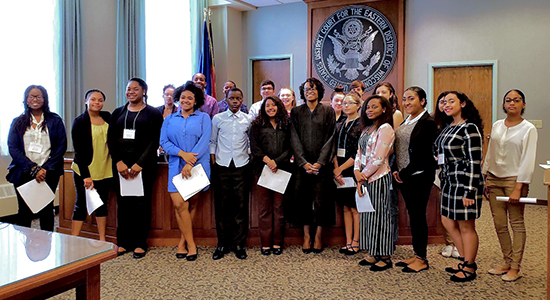
Standing with the participants of the 2018 Summer Youth Institute is Magistrate Judge Nancy Joseph (center), U.S. District Court, Eastern District of Wisconsin – and a key organizer of the program, now in its sixth year. Photo courtesy of the Summer Youth Institute.
Aug. 15, 2018 – It isn’t every 15-year-old who is thrilled to see the inside of a courtroom.
But that was the reaction of Anya Ramos, a participant in the 2018 Summer Youth Institute.
Anya was already interested in law, according to her mother, Roslinda Moreno, before attending this year’s institute. “She likes to stick up for her friends,” she said. But the institute, which introduces 24 middle and high school students to the legal profession, “made her more excited about law,” Moreno said.
The Summer Youth Institute is the vision of Magistrate Judge Nancy Joseph, U.S. District Court, Eastern District of Wisconsin, who approached Marquette Law School and the Eastern District of Wisconsin Bar Association (EDWBA) to get it going. The first institute took place in 2013 and is a collaborative effort.
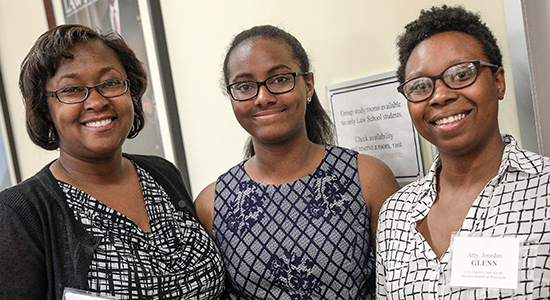
Program participant Joy Mitchell, 15, center, stands with her mother, Jackie, left, and her new attorney mentor, Jourdan Glenn, right.
A Program of Three Parts
The institute introduces students entering grades 8, 9, or 10 to the legal profession. Enrollment is capped at 24 students, who must live and go to school in Milwaukee. The program encourages students who are first-generation college-bound or those who speak English as a second language to apply.
Shannon Green is communications writer for the State Bar of Wisconsin, Madison. She can be reached by email or by phone at (608) 250-6135.
The goal is to provide exposure law as a profession for first-generation college-bound students, low-income students, and students of underrepresented populations. Ultimately, the goal is to contribute to the diversification the profession.
The program has three parts: A seven-day institute held in late July; a year-long mentoring program pairing participants with lawyers or judges; and a four-week internship at a law firm or court the following summer.
“This is a wonderful program that gives the students opportunities they would not get otherwise,” said Milwaukee County Circuit Court Judge Glenn Yamahiro, who has participated in the program for three years.
The EDWBA’s support reflects a commitment to the future of the profession, said Association President Donald Daugherty. “We are introducing youth to the practice of law who we hope that, someday, we will welcome as members of our association,” he said.
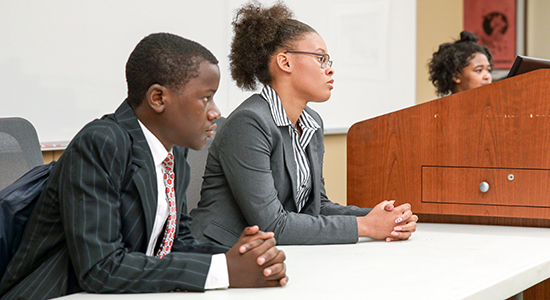
Institute participants Omari Wilondja, left, and Arniya Brown, right, listen to feedback on their oral arguments from the judging panel.
Getting to Know the Legal System
Melissa Love Koenig, professor of law at Marquette University, is the primary instructor for the institute. “It’s really like a whole semester compressed into just a few days,” she said.
Topics of discussion for the students include an introduction to the U.S. legal system, the First Amendment and due process, case analysis, the role of mentors, and dressing for success – along with plenty of opportunities to network. They tour the Marquette Law School and get acquainted with its library via a scavenger hunt. And there is homework every night.
“Each year, it’s incredible to watch the students blossom,” said Judge Joseph.
Students also take field trips to see lawyers in action. They visit the Milwaukee Municipal Court, the Milwaukee County Circuit Court, and the Federal Courthouse in Milwaukee. They learn about different practice areas by seeing lawyers working in a law firm, as in-house counsel, and as public interest lawyers.
They take their knowledge back to their families and neighborhoods. They will learn the legal system, and they want to make it work for their communities.
– Judge Janet Protasiewicz
They are also introduced to other careers in law, such as paralegals, court reporters, interpreters, probation officers, and FBI agents.
“We want to plant those seeds as well – that they don’t have to be a lawyer to be involved in the legal system,” Judge Joseph said.
Students, meeting with legal professionals with backgrounds similar to their own, learn that becoming a lawyer or other professional is actually an attainable goal for them. "Becoming a legal professional is not an esoteric, jump-over-the-moon thing," said Judge Carl Ashley, chair of the State Bar Diversity and Inclusion Oversight Committee, who has participated in the program as a presenter and oral arguments judge. "It's giving them the idea of what they can do with a legal education and helping them stay focused on what they need to do to achieve that goal."
Jayde Gathings, 15, already decided to become a lawyer before applying for the 2018 institute.
She made the decision when she realized that lawyers help people in tangible ways. “I’ve decided I want to dedicate my life to do that,” she said.
Participating in the institute – with its homework and an oral arguments presentation – was more difficult than she thought at first. “I realized this is a serious thing,” Gathings said. “Like a job.”
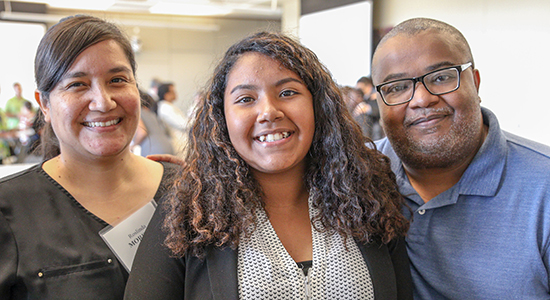
Parents are actively involved in the institute. Participant Anya Ramos, center, pictured with parents Roslinda Moreno and Carols Ramos, plans to become a lawyer.
‘Their Skills Are Impressive’
On the last day of the institute, students present 10-minute oral arguments – with opening and closing statements – on a fictional case in front of a panel of judges and attorneys. The students are given time during the institute to prepare and practice and receive feedback from instructors and mentors.
“Their skills are impressive,” said Judge Yamahiro, in his third year judging the oral arguments.
The panelists – volunteers who come in for a couple of hours – prepare by reading about the case beforehand. The students are told to expect questions and to be prepared to be persuasive in their arguments.
“It’s incredible how much work the students put into this, in the midst of all the other activities they are doing,” Judge Joseph said.
We want to plant those seeds as well – that they don’t have to be a lawyer to be involved in the legal system.
– Judge Nancy Joseph
The oral arguments give the students a taste of what the future may hold. “It’s an eye-opening experience for them,” she said. “And our judges – lawyers and judges – do a really great job with the students.”
During the orientation for the judging panel, Judge Joseph reminds them to keep in mind that the students aren’t lawyers or law students – and some aren't even high school students yet – no matter the high level of skill they demonstrate.
“The idea is the experience, getting a taste of one of the things lawyers do,” Judge Joseph said, and to help the students learn to communicate well. “This is a skill set you can take anywhere.”
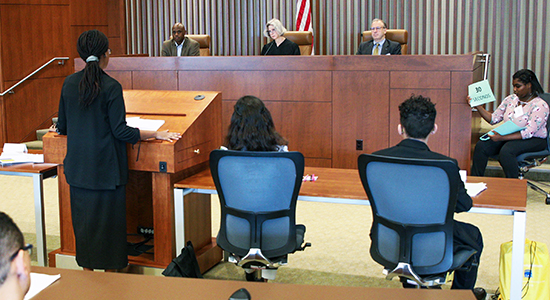
Judge Pamela Pepper (center), with attorneys Nelson Phillips (left) and Donald Daugherty (right) listens to a student during oral arguments held in a courtroom at Marquette Law School. Students are allowed 10 minutes and field tough questions from the panel members.
Mentors and Mentees
During the summer institute, students first meet with their attorney-mentors who follow their progress over the coming year.
Jourdan Glenn – a 2018 U.W. Law School grad – did not hesitate to get involved as a mentor, and was matched with eighth-grader Joy Mitchell. “I love being around young people and being able to guide them and give them advice,” Glenn said. “I get so much out of it.”
The institute is a great opportunity to learn things about the legal profession she didn’t know, Mitchell said. For example, she learned that lawyers are people with morals and ethics. “It’s not always about the facts,” she said. “At the end of the day, they are people and can be affected by their case.”
Mitchell also learned practical information. “I learned that in appellate court, they just want the facts,” she said.
In addition to judging oral arguments at the 2018 institute, Susan M. Knepel, an attorney with the Eastern District of Wisconsin, mentored a ninth-grade student in 2017. “She was a really good student,” Knepel said. “She really had her act together.”
Knepel not only helped educate the student about the law and legal careers and offered guidance on professionalism (such as writing thank-you notes), she also met the student’s family and attended her dance recitals. “It was a very positive experience for me – it was something I ordinarily would not have done,” she said.
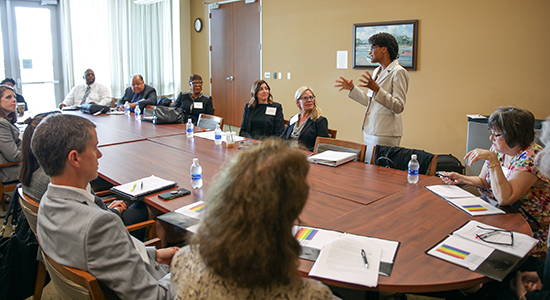
Judge Nancy Joseph briefs lawyers and judges who evaluate students’ oral arguments on the final day of the Summer Youth Institute at Marquette Law School.
Milwaukee County Circuit Court Judge Janet Protasiewicz has judged the oral arguments each year since the program began five years ago. Despite having only one week to prepare, the students communicate well and with poise.
“What these students do is remarkable,” she said.
Judge Protasiewicz just met her mentee for the coming year – and is staying in touch at the moment via text messages. She expects to bring her to court with her during the year when the opportunity rises.
Now that the students have seen various courtrooms and other legal professionals at work, they will be well prepared. “When I started law school, I didn’t know how to put my appearance on the record,” Judge Protasiewicz said.
“They take their knowledge back to their families and neighborhoods,” she said. “They will learn the system, and they want to make it work for their communities.”
Creating a Pipeline to the Legal Profession
In addition to the Summer Youth Institute from Marquette Law School and the EDWBA and the U.W. Law School Pre-Law Scholars Program (PLUS), other programs focus on introducing students – whether school age or college – to the legal profession.
Programs include:
Continuing a Legacy
A great benefit of the program is the connections the participants make with those in the legal profession who are willing to “give a pointer or two” and mentor the participants, said Marquette Law School Dean Joseph Kearney.
Another important benefit, Dean Kearney said, is that the participants gain a champion: Judge Joseph.
Graduates of the program tend to stay in touch and involved – from volunteering as bailiffs during the oral arguments, to reaching out to the new program participants, to maintaining a relationship with their mentors and Judge Joseph.
Six years into the program, the oldest of the alumni are now in their first years of college. One alumni, Ismail El-Hassan, completed his participation in the program in 2014 and attends U.W.-Madison as an undergrad. He remains connected to the program which, he said, “has significantly impacted me.”
We are introducing youth to the practice of law who we hope that, someday, we will welcome as members of our association.
– Donald Daugherty, president, Eastern District of Wisconsin Bar Association
Majoring in economics and international studies, El-Hassan plans to enter law school after graduation. His decision is a result not only of the institute, he said, but of the U.W. Law School’s Pre-Law Scholars Program (PLUS), which he recently attended on Judge Joseph’s recommendation.
It is important, he said, to make the most of the opportunities that come your way. “Opportunities and people you come in contact with in the institute are not something to forget – their influence can guide you for years afterward,” El-Hassan said.
It can be difficult, he said, for young people with little knowledge of the legal profession – especially those who are the first in their families to plan to attend college – to picture themselves working in the field as a profession without help from programs like the Summer Youth Institute and the PLUS program.
“I can see myself attaining this goal, as long as I work hard and persevere,” El-Hassan said.
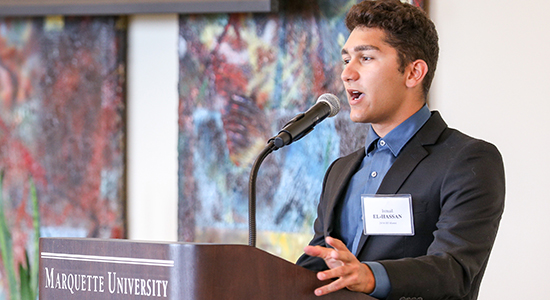
Ismail El-Hassan speaks at the closing banquet on the last day of the institute. An alumnus of the program and now an undergraduate at U.W.-Madison, he said the program helped solidify his aim to become a lawyer.
‘We’ve Got Your Back’
The notion that students can achieve their goals through hard work and perseverance is a theme.
The lawyers, judges, and mentors provide the students “a little kick in the right direction,” Judge Joseph said, but the students have the raw talent and energy to make the community better.
“There is no stopping you,” she told the students on the institute’s final day. “If you want to put in the hard work, we’ve got your back.”
